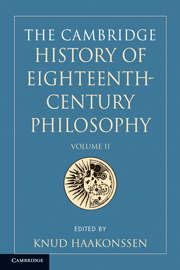Book contents
- Frontmatter
- III Philosophy and Theology
- 21 Natural and Revealed Religion
- 22 Revealed Religion: the Continental European Debate
- 23 Revealed Religion: The British Debate
- 24 Arguments for the Existence of God: The British Debate
- 25 Arguments for the Existence of God: The Continental European Debate
- 26 The Problem of Theodicy
- 27 Religion and Society
- IV Natural Philosophy
- V Moral Philosophy
- Biobibliographical Appendix
- Bibliography
- Index nominum
- Index rerum
- References
25 - Arguments for the Existence of God: The Continental European Debate
from III - Philosophy and Theology
Published online by Cambridge University Press: 28 March 2008
- Frontmatter
- III Philosophy and Theology
- 21 Natural and Revealed Religion
- 22 Revealed Religion: the Continental European Debate
- 23 Revealed Religion: The British Debate
- 24 Arguments for the Existence of God: The British Debate
- 25 Arguments for the Existence of God: The Continental European Debate
- 26 The Problem of Theodicy
- 27 Religion and Society
- IV Natural Philosophy
- V Moral Philosophy
- Biobibliographical Appendix
- Bibliography
- Index nominum
- Index rerum
- References
Summary
Natural or rational theology, as opposed to revealed theology, is concerned with the knowledge of God which can be attained by human reason without the help of revelation. Traditionally, a central part of natural theology is devoted to the arguments for the existence of God, that is, to rational demonstration of the existence of God through the light of unaided natural reason. Not surprisingly, therefore, philosophical arguments for the existence of God (intended as first cause or first principle) pre-date Christianity. Yet they became an integral part of traditional Christian theology from the patristic period onward as preamble to the specifically Christian revelation by providing arguments which are valid for every human being on purely rational grounds. To be sure, different thinkers held different and often opposite views regarding the way in which human reason can lead to God – notably whether human reason can prove the existence of God a priori (that is to say, according to scholastic terminology, from the cause to the effect or, according to modern terminology, independently of experience) or a posteriori (from the effect to the cause, or, in the modern sense, starting from experience). But despite these important differences, both camps agreed that unaided human reason could prove God’s existence. The outbreak of the Protestant Reformation in the sixteenth century undermined this Christian consensus by raising a question preliminary to that of whether the way of human reason to God is a priori or a posteriori. Following in the footsteps of Martin Luther and Jean Calvin, Protestant theologians asked: is natural theology even possible? In other words, is a true knowledge of God available to human reason after the Fall and before revelation? More specifically, is it at all possible for unaided natural reason to prove the existence of God? This general question of principle gained new prominence and had to be addressed before entering the discussion of specific proofs of His existence.
- Type
- Chapter
- Information
- The Cambridge History of Eighteenth-Century Philosophy , pp. 731 - 748Publisher: Cambridge University PressPrint publication year: 2000
References
- 2
- Cited by



